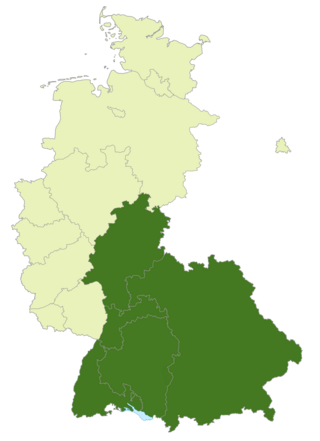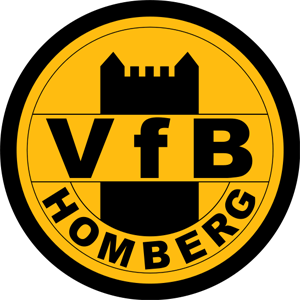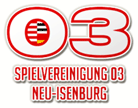
Offenbacher Fussball-Club Kickers, commonly known as Kickers Offenbach, is a German association football club in Offenbach am Main, Hesse. The club was founded on 27 May 1901 in the Rheinischer Hof restaurant by footballers who had left established local clubs including Melitia, Teutonia, Viktoria, Germania and Neptun. From 1921 to 1925 they were united with VfB 1900 Offenbach as VfR Kickers Offenbach until resuming their status as a separate side, Offenbacher FC Kickers. Since 2012, Kickers Offenbach's stadium has been the Sparda Bank Hessen Stadium.

SV Viktoria 01 Aschaffenburg is a German football club based in Aschaffenburg, Bavaria.

VfR Bürstadt is a German association football club playing out of Bürstadt, Hesse. The team was founded 1 February 1910 as SC 1910 Bürstadt and took on the name VfR on 23 August 1919. Between 1973 and 1983 they played as VfR Oli Bürstadt in recognition of sponsoring firm Otto Limburg Bürstadt-Bobstadt.

FC Heilbronn was a German association football club based in Heilbronn, Baden-Württemberg formed in 2003 out of a merger between VfR Heilbronn and Heilbronner SpVgg.
VfR Wormatia 08 Worms is a German association football club that plays in Worms, Rhineland-Palatinate. The club and its historical predecessors were regular participants in regional first-division football competition until the formation of the national top-flight Bundesliga in 1963.

Borussia Fulda is a German association football club from Fulda, Hesse. The club was founded 4 July 1904 as FC Borussia 1904 Fulda and underwent a number of changes in 1923 when they were first joined by Radsportclub 1907 Fulda in July, and then by Kraftsportklub Germania Fulda in September. On 6 September 1923, the association was named 1. SV Borussia 04 Fulda.
SpVgg SV Weiden, formerly just SpVgg Weiden, is a German association football club from the city of Weiden, Bavaria. Playing in the tier-four Regionalliga Süd in 2010–11, the club had to declare insolvency after being more than Euro 1 million in debt. Unable to raise enough funds to continue competing in the league, Weiden declared on 30 November 2010 that it would withdraw its Regionalliga team and thereby automatically be relegated. All games for the club in the 2010–11 season were declared void.
The Verbandsliga Hessen-Süd, until 2008 named Landesliga Hessen-Süd, is currently the sixth tier of the German football league system. Before the introduction of the Regionalligas in 1994, the "Verbandsliga Hessen-S" served as the fourth tier of the German league system in the southern part of the state of Hesse. The league also served as the fifth tier of the league system before the introduction of the 3. Liga in 2008

The 2. Oberliga Süd was the second-highest level of the German football league system in the south of Germany from 1950 until the formation of the Bundesliga in 1963. It covered the three states of Bavaria, Baden-Württemberg and Hesse.

The VfB Homberg is a German association football club from the Homberg quarter of Duisburg, North Rhine-Westphalia. The club was formed July 1969 through the merger of Homberger Spielverein and Sportvereinigung 89/19 Hochheide.

VfB Speldorf is a German association football club from the city of Mülheim an der Ruhr, North Rhine-Westphalia.
SpVgg Kaufbeuren is a German association football club from the town of Kaufbeuren, Bavaria. The roots of the association are in the establishment on 8 August 1858 of the gymnastics club and community fire brigade Turnfeuerwehr Kaufbeuren.

The SpVgg Greuther Fürth II is the reserve team of the German association football club SpVgg Greuther Fürth from the city of Fürth, Bavaria.

VfL Köln was a German association football club from the city of Cologne, North Rhine-Westphalia. The club was formed out of the pre-war merger of Kölner Club für Rasenspiele and Kölner Sport-Club 1899, through which it lays claim to being the city's oldest football club.

Union Böckingen is a German sports club from the district of Böckingen in the city of Heilbronn, Baden-Württemberg. Founded in 1908 out of the merger of Fussball Klub Germania 08 Böcking and Viktoria Böcking, the club today has 1,200 members in departments for canoeing, handball, and skiing. The footballers made up the largest section in the club with nearly 600 members. The most successful department is the canoe section which has won medals at the national and world championships.

VfL Neckarau is a German association football club from the district of Neckarau in the city of Mannheim, Baden-Württemberg.

VfR Achern is a German football club from the city of Achern, Baden-Württemberg near the Hornisgrinde mountain. The club was established on 17 October 1907 as Fußball-Club Achern and adopted the name Verein für Rasenspiele Achern in 1910.
SG Andernach is a German football club from the city of Andernach, Rhineland-Palatinate. The club was formed in 1999 through the merger of the football departments of SpVgg Andernach, BSV 1910 Andernach, and DJK Boulla Andernach based in the earlier association between these sides going back to 1992. SpVgg was the best known of these predecessor sides, having taken part in the first division play in the Gauliga Mittelrhein and Gauliga Moselland under the Third Reich and in the Fußball-Oberliga Rheinland-Pfalz/Saar after World War II.
SpVgg Beckum is a German association football club from the city of Beckum, North Rhine-Westphalia. The team first came to note as a third-division side following the formation of the Bundesliga (I) in 1963.














